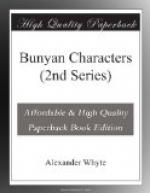But what her husband’s conversion, good example, and most earnest entreaties could not all do for his worldly wife, that his sudden death speedily did. And thus it is that both Christiana’s best life, all our interest in her, and all our information about her, dates, sad to say, not from her espousal, nor from her marriage day, nor from any part of her married life, but from her husband’s death. Her maidenhood has no interest for us; all our interest is fixed on her widowhood. This work of fiction now in our hands begins where all other works of fiction end; for in the life of religion, you must know, our best is always before us. Well, scarcely was her husband dead when Christiana began to accuse herself of having killed him. To take her own bitter words for it, the most agonising and remorseful thoughts about her conduct to her husband stung her heart like so many wasps. Ah yes! A wasp’s sting is but a blade of innocent grass compared with the thoughts that have stung us all as we recalled what we said and did to those who are now no more. There are graves in the churchyard we dare not go near. “I have sinned away your father!” she cried, as she threw herself on the earth at the feet of her astounded children. “I have sinned away your father and he is gone!” And yet there was no mark of a bullet and no gash of a knife on his dead body, and no chemistry could have extracted one grain of arsenic or of strychnine out of his blood. But there are many ways of taking a man’s life besides those of poison or a knife or a gunshot. Constant fault-finding, constant correction and studied contempt before strangers, total want of sympathy and encouragement, gloomy looks, rough remarks, all blame and never a word of praise, things like these between man and wife will kill as silently and as surely as poison or suffocation. Look at home, my brethren, and ask yourselves what you will think of much of your present conduct when it has borne its proper fruit. “Upon this came into her mind by swarms all her unkind, unnatural, and ungodly carriages to her dear friend, which also clogged her conscience and did load her with guilt. It all returned upon her like a flash of lightning, and rent the caul of her heart asunder.” “That which troubleth me most,” she would cry out, “is my churlish carriages to him when he was under distress. I am that woman,” she would cry out and would not be appeased—“I am that woman that was so hardhearted as to slight my husband’s troubles, and that left him to go on his journey alone. How like a churl I carried myself to him in all that! And so guilt took hold of my mind,” she said to the Interpreter, “and would have drawn me to the pond!”




